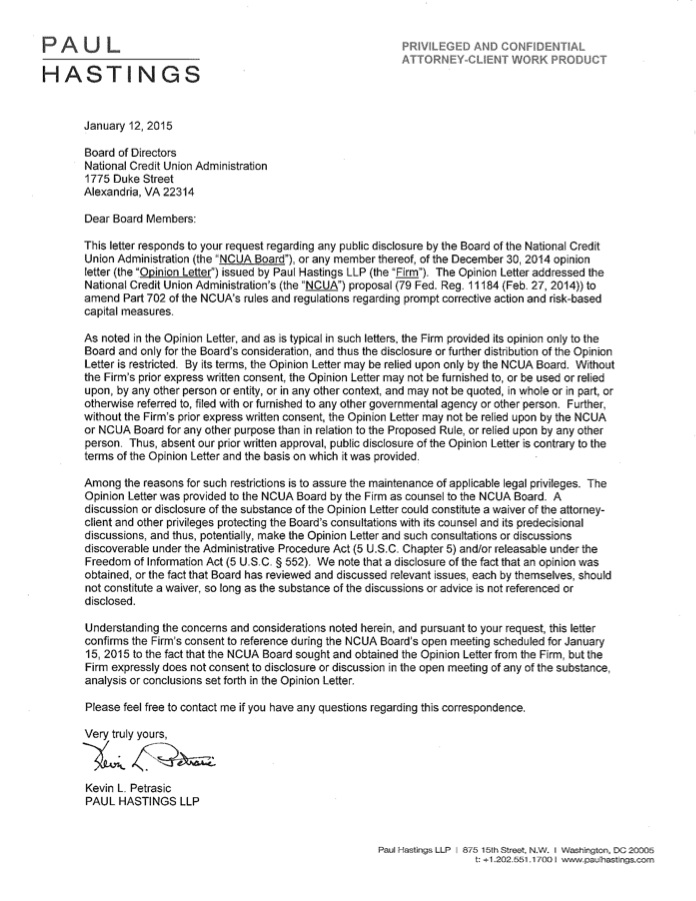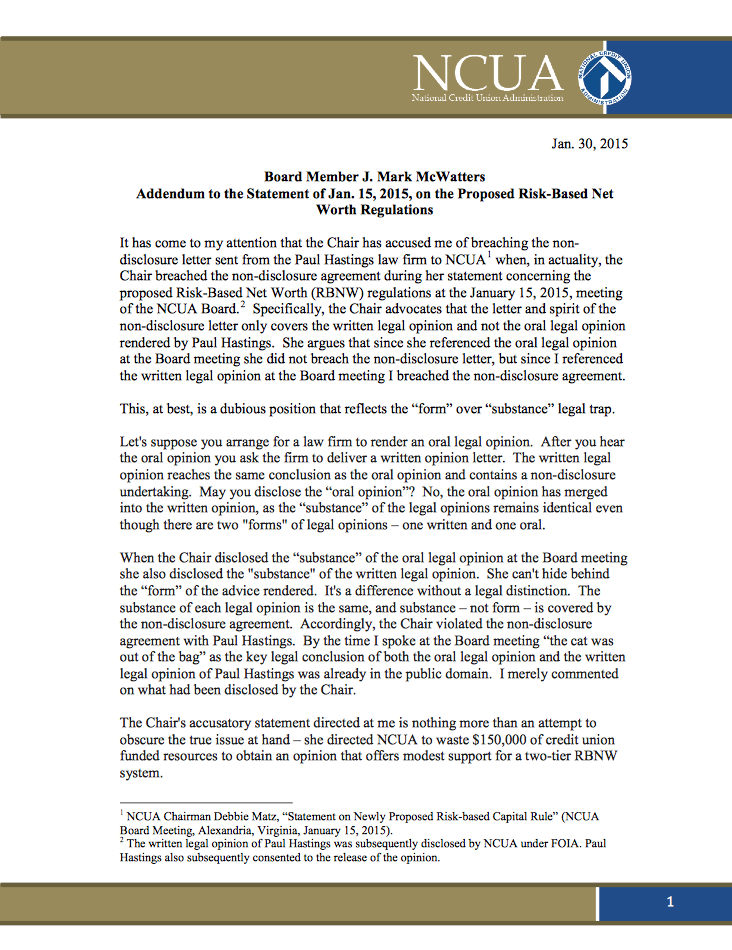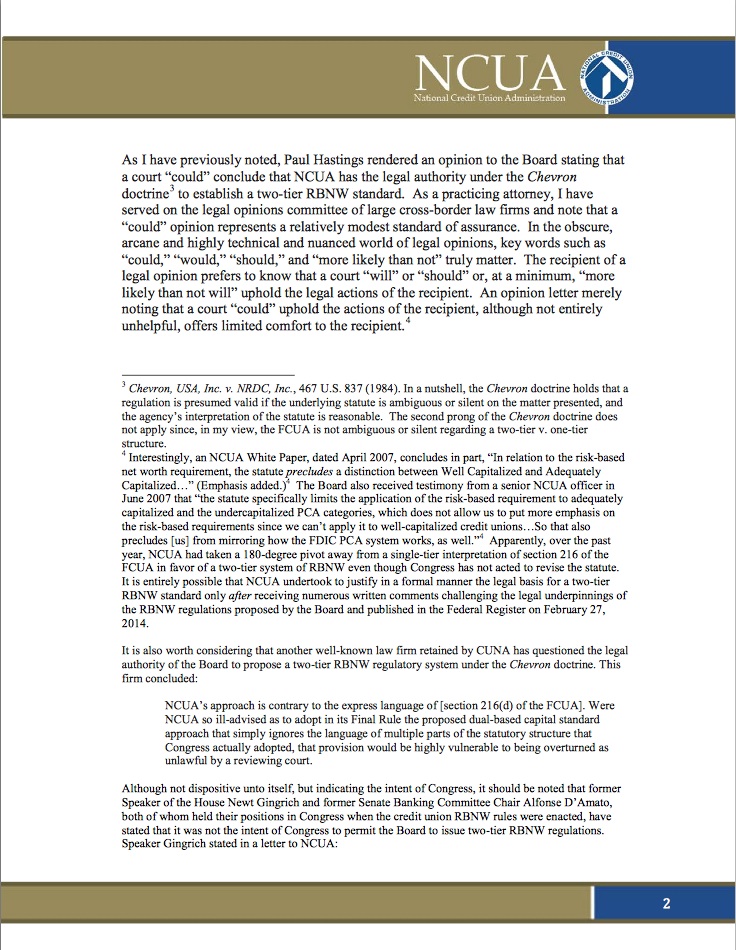NCUA board members battled tit for tat Friday as Chairman Debbie Matz and Board Member J. Mark McWatters accused each other of revealing confidential details from a legal opinion supporting the agency's authority to require risk-based capital standards.
In a series of releases and footnotes to the Jan. 15 board meeting statements posted on the NCUA's website, Matz and McWatters debated how details from the opinion from Washington law firm Paul Hastings were made public.
In a footnote added Thursday to her January board meeting official statement posted on the NCUA's website (shown above), Matz accused McWatters of violating a confidentiality agreement with the firm when he sourced the written opinion in his meeting statement.
McWatters, who voted against the revised risk-based capital proposal, read the statement out loud during the Jan. 15 meeting.
“The board received an oral opinion from the Paul Hastings law firm, which provided support for our decision to proceed with the two-tiered approach. Subsequent to the oral opinion, the firm provided a privileged, substantive written opinion,” Matz wrote in the footnote.

“My statement during the open meeting on January 15, 2015 clearly and deliberately referred to the oral opinion. Regretfully, Board Member McWatters quoted directly from the firm's written opinion during the open meeting and, in so doing, violated the firm's policy regarding the confidentiality of that opinion.”
Matz said she had planned to release the written opinion at the Jan. 15 board meeting, but received a letter from the law firm Jan. 12 that refused, detailing the confidentiality agreement. That letter is shown at left; click to expand.
Read more: McWatters responds …

McWatters responded Friday in an addendum posted online to his board meeting statement that refuted Matz's accusation. The three-age addendum is shown at left; click to expand.
McWatters said it was Matz who violated the non-disclosure agreement.
“By the time I spoke at the board meeting 'the cat was out of the bag' as the key legal conclusion of both the oral legal opinion and the written legal opinion of Paul Hastings was already in the public domain. I merely commented on what had been disclosed by the chair,” McWatters wrote.
He also called the chairman's statement a dubious position that reflected the form over substance legal trap.
“When the chair disclosed the substance of the oral legal opinion at the board meeting she also disclosed the substance of the written legal opinion. She can't hide behind the form of the advice rendered. It's a difference without a legal distinction. The substance of each legal opinion is the same, and substance – not form – is covered by the non-disclosure agreement,” he added.

Matz followed up in a Friday release, explaining Paul Hastings verbally agreed Matz could reference the oral opinion at the board meeting.
“The oral legal opinion maintained that while certain parts of the Federal Credit Union Act are arguably ambiguous, it did support our proceeding with a two-tier risk-based capital framework comparable to the banking agencies—with one threshold to be adequately capitalized and a second threshold to be well-capitalized,” Matz wrote in her official Jan. 15 statement and again Friday.
However, she added, the NCUA was contractually obligated to keep the firm's written opinion confidential.
Also on Friday, Matz released the letter requiring confidentiality from Paul Hastings, as well as a copy of the legal opinion.
 McWatters also said Matz wasted money on the legal opinion, which only provides modest support for a two-tier risk-based net worth system.
McWatters also said Matz wasted money on the legal opinion, which only provides modest support for a two-tier risk-based net worth system.
“The chair's accusatory statement directed at me is nothing more than an attempt to obscure the true issue at hand – she directed NCUA to waste $150,000 of credit union funded resources to obtain an opinion that offers modest support for a two-tier RBNW system,” he said.
“With so many critical issues facing the credit union community today, the ongoing attempt by the chair to discredit my efforts to provide meaningful transparency and inform credit unions of what is taking place within NCUA demonstrates a sad state of affairs at the agency,” McWatters added.
© Touchpoint Markets, All Rights Reserved. Request academic re-use from www.copyright.com. All other uses, submit a request to [email protected]. For more inforrmation visit Asset & Logo Licensing.






